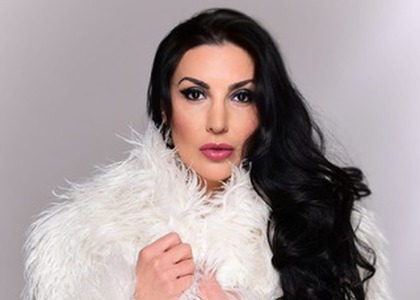> Interviews

Interview with Ramona Zaharia
Ramona Zaharia, on October 25th you are singing on the stage of the Romanian Atenaeum in an event that combines the elegance of the royal gala with a charitable mission. It's the Royal Charitable Concert, now at the 16th edition organized by the Princess Margareta Foundation with the purpose of supporting young talents. What do you think about the role of the artist? What is your role here, in this kind of concert that blends music with social responsibility?
I could say that my motivation comes from my principle that talent, no matter how special it is needs support to turn into a tragic destiny and the fact that I contribute to this cause to know that I do my best and as a form of gratitude and and responsibility when it comes to future.
You are known nationally and internationally especially for your great interpretation of the role of Camen Bizet's opera. What songs did you choose to song at this royal concert? Will the audience also hear moments from Carmen?
Yes, parts from Carmen, an aria from Verdi and a Zarzuela by Chapi.
You will perform in the company of the New Hope Orchestra conducted by David Crescenzi, the Romanian National Choir trained by Daniel Jinga will also be on stage, and of course you will have as a partner tenor George Vīrban, who is in fact a former scholarship holder of the Princess Margareta Foundation. Do you already know each other, did you collaborate before?
We don't know each other personally, but we wrote, we talked to each other, I keep up with his career and I am very happy for him and for the fact that he was offered this chance through the scholarship given by the Princess Margareta Foundation, especially as I appreciate him a lot for his talent, for his wonderful and expressive voice.
So don't you sing together?
We do.
Songs from Zarzuela or from Carmen?
From Carmen.
What is the red thread running through the musical program you chose? Did you agree together with David Crescenzi, with Daniel Jinga?
We decided together with David Crescenzi and we came to this program. I can say that I am very glad, because it will be a program that will be very much appreciated, at least this is what I hope.
The concert takes place of course also with the members of Romania's Royal Family. What does it mean to you to appear in this context on the stage of the Athenaeum?
It makes me happy and honors me, of course, and I hope to rise to the expectations.
You told us a little about George Vīrban and a lot more as a Romanian artist who performs extensively abroad being employed in a German institution, how do you see the evolution of the young generation of Romanian opera singers and what concrete forms of support do you think it would be preferable scholarships, mentorship, internships abroad participation in competitions?
There are a lot of things to say. First of all, I can say that I am very close to the new generation and I see that the young and very young generation is very talented and I can see a happy future in the art of singing. What would I wish for? I think there should be more support programs. For example, if there could be a collaboration between opera houses and conservatories, it would be extraordinary for them to be able to attend rehearsals, to have, as they do abroad, Open Studio or Young Artist Programs, so that they would be much more in contact with what really happens in real life, and also to be ready psychologically, because being ready psychologically matters a lot. You can be extremely talented, you can be hardworking, but if you are not ready psychologically, then you cannot even give 50% of what you can offer.
What helped you personally the most at the beginning of your career?
I was helped by the fact that I had people who had more confidence in me than I had in myself. I am a shy person by nature and I had to cure myself little by little. There is no antidote to shyness, but I think we get used to ourselves and to the feeling of stress and we already have more comfort.
Did you have a scholarship?
No, I didn't have any scholarship. I think it would have helped me a lot, because I would have liked to go to many auditions, but I couldn't because didn't have financial support, which is very, very important.
Translated by Luiza-Elena Dumitrache,
University of Bucharest, Faculty of Foreign Languages and Literatures, MTTLC, year I
Corrected by Silvia Petrescu














